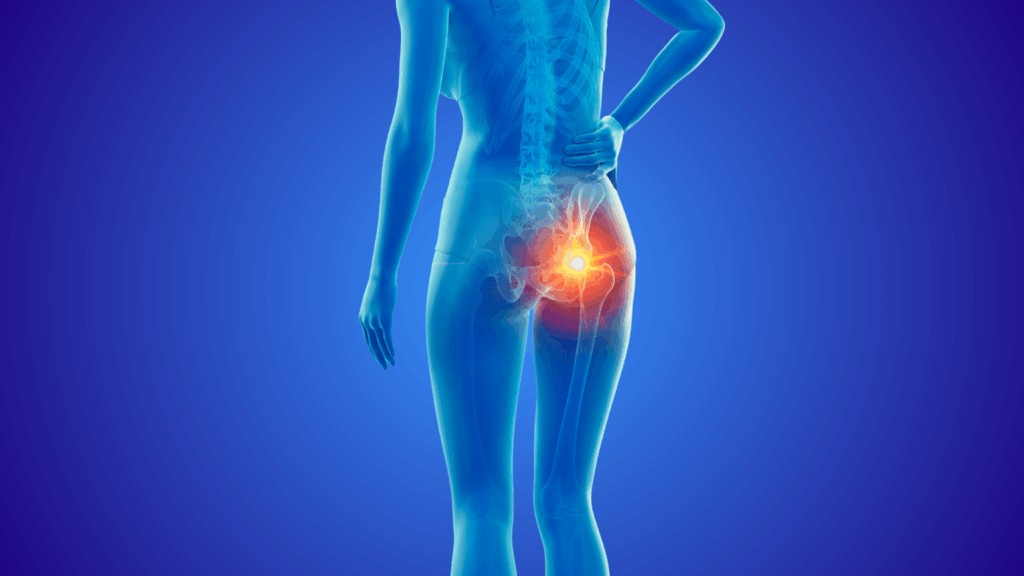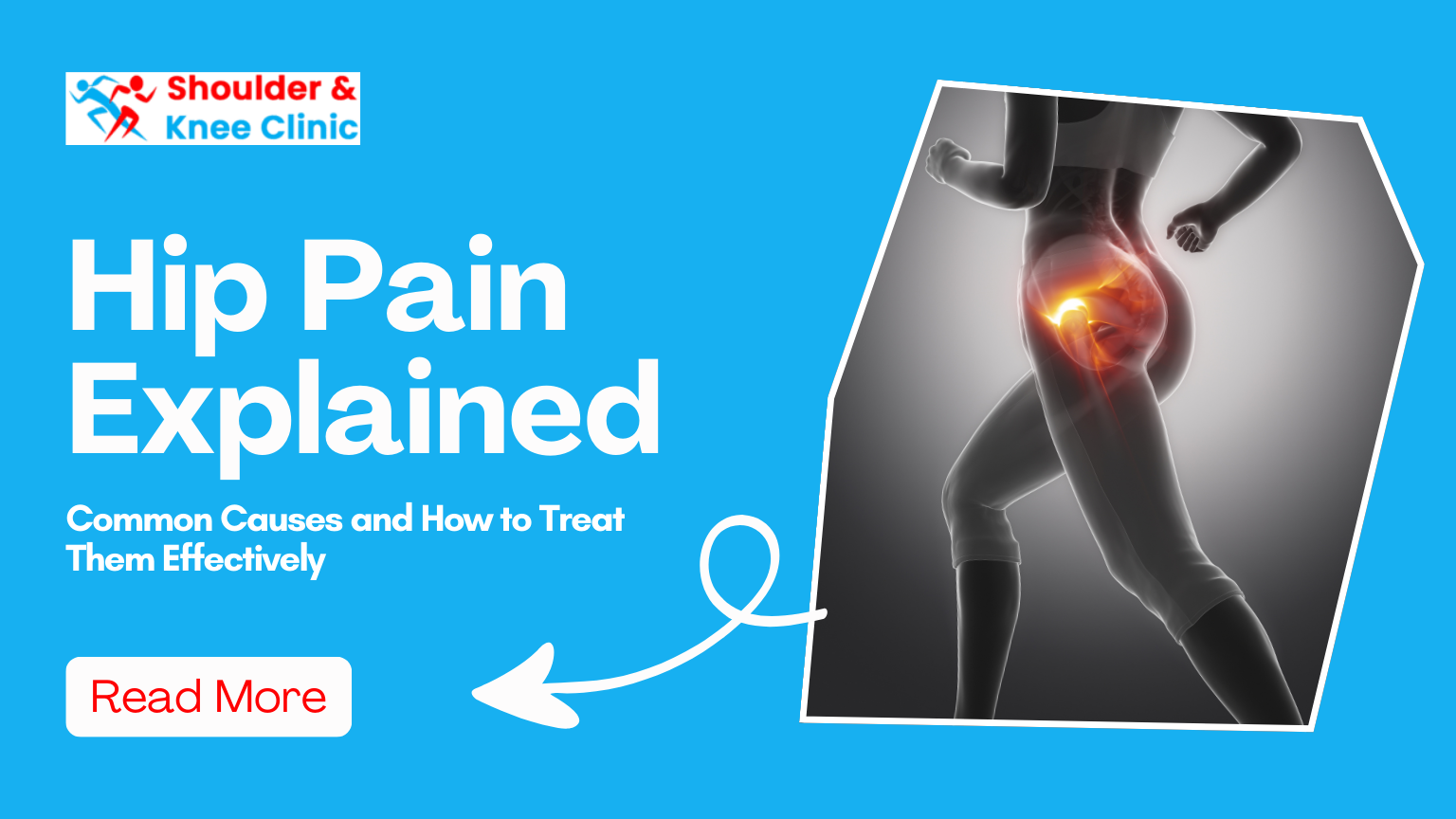
Introduction
To comprehend the dynamics of hip discomfort, one needs to take a deep look into the mechanics of the hip joint. You can think of it as a ball and socket joint where the pelvic bone is acting as the socket and the femur head resembles that of a ball.
The joint mechanisms are aided by cartilage (a wide and fluid tissue) and ligaments, and there’s also an alleviation by fluid pouches known as bursae. These, in turn, keep frictions between muscles, tendons, and bones at bay. It is to be noted that a network of muscles also plays a vital role in the overall functioning of the joint movements.
So, it can be comprehended that issues arising in any of these key elements of the joint can lead to hip pain.
One needs to be aware that there are generic hip pain symptoms. Identification of the exact location of your hip pain is vital, and it helps you portray the picture to your healthcare provider.
There are a few proven perspectives on it-
- In cases where the pain lies within the hip joint, the pain is felt inside the hip, i.e., anterior hip pain
- In cases of lateral hip pain, the pain is felt on the side of the hip. In other cases, i.e., posterior hip pain, it’s on the outside of the hip near one’s buttocks.
Common Causes of Hip Pain
There are numerous circumstances that generally articulate the low hip pain causes:
- Osteoarthritis- Mostly prevalent in older people, it is a condition where the general corrosion affects the functioning of the cartilage that safeguards the hip joint. And that lack of protection causes the pain in the hips. Patients also reported experiencing a limited range of motion in their hips.
- Hip Fractures- It might happen due to a bad fall, or in a contact sports or it might be just of your ageing. It sometimes causes by repetitive stress on the hip bones and is often seen in players and athletes.
- Bursitis- The function of bursae has been mentioned earlier in the blog. So, when the bursae get inflamed, they cause pain. It happens because of the redundant activities that irritate or overwork the hip joint.
- Tendon strain (Tendinitis)- The function of tendons (wide bands of tissue) is to attach bones to muscles. Tendinitis is the aggravation or swelling of the tendons. It’s generally caused by tedious stress from overuse.
- Labral Damage- When the labrum cartilage experiences damage due to frequent distorted movements, hip pain comes into the picture. This is because the labrum cushions your hip joint and functions like a gasket or rubber seal to maintain the structure, including the socket of your hip. Again, in this case, athletes/sports players are at higher risk of developing this issue.
Some other hip pain causes:
- Bone cancer- though it is rare, bone cancer patients experience hip pain due to the degradation of hip bones or due to the growth of the tumor. The pain increases during the night, and it can cause swelling around the hip over time.
- Avascular necrosis- It’s a special condition where the ease of fluidity of the blood to the hip bone decelerates, and the bone tissue perishes. The underlying cause can be dislocation or hip fracture, or even taking high doses of steroids.
Treatment Options
Hip pain causes treatment is generally dependent on the diagnosis through physical exams, imaging, etc. So, it’s always best to consult an experienced doctor before you act on your hip treatment. It normally involves-
- In cases where the cause is regarding a muscle or tendon strain, or tendinitis, proper medications like acetaminophen are recommended, or a non-steroidal drug such as naproxen/ibuprofen does the job. Ensure that a doctor has recommended them, rather than you doing permutations with them, without any idea.
- Some home remedies are effective too, such as the application of ice for about 15 minutes, a few times a day. And there are others like- (a) compression, (b) RICE method, (c) elevation of your hips above the level of your heart, (d) applying heat, such as a warm shower, may alleviate the pain.
- Hip pain exercises help in strengthening the muscles around your hip. Also, physical therapy can alleviate pain and also help in the betterment of your motion ranges.
- Surgeries are recommended for patients whose osteoarthritis becomes severe. It’s basically known as hip arthroscopy, and you should seek a renowned orthopaedic surgeon for a better lifestyle in the future. You can reach out to us at shoulderandkneeclinic.com for the best orthopaedic surgeon in Mumbai.
There are certain alternative treatments such as:
- Chiropractic care: Proper chiropractic care can help alleviate hip pain as it aligns your spine in the correct position. So, you should know that sometimes bad spinal alignments lead to hip pain.
- Acupuncture: state-of-the-art acupuncture might help reduce the pain and inflammation, and is sometimes used along with other treatments.
Prevention Tips
While complete prevention cannot be achieved throughout your lifetime, one can abide by some strategies to refrain from experiencing hip issues. Those are:
- By having a healthy diet
- Shredding excess fat, if you are overweight
- Opt for low-impact activities like biking, swimming, etc
- Stretching prior to or post-exercise
- Wearing proper shoes for running and avoiding hard surfaces
- Practicing yoga to enhance your overall body balance
When to See a Doctor
You should seek an immediate professional healthcare provider if:
- The hip pain is caused by a sudden fall, accident, or injury during sports activities
- The hip region is badly deformed, bruised, or bleeding
- The pain is increasing by the hour
- It’s becoming extremely difficult to move your hip or walk with a heavy weight
Moreover, an orthopaedic doctor or a surgeon should be consulted in moderate hip pain, if it is accompanied by:
- Fever
- Prolonged pain for more than a week
- Foot weakness
- Swelling
- Burning sensation over the hip
Conclusion
Though hip pain is common among elderly people and athletes, getting the proper treatment is challenging. It requires an experienced orthopaedic surgeon/doctor to go through your diagnosis reports and then follow a complete course of action, recommended to you by the respective surgeon.
In extreme cases, your doctor or healthcare expert might recommend that you go for surgery, which will offer prompt relief from the hip pain.
Contact us today at shoulderandkneeclinic.com to get in touch with the best experts and surgeons in Mumbai and gift yourself a better lifestyle.

